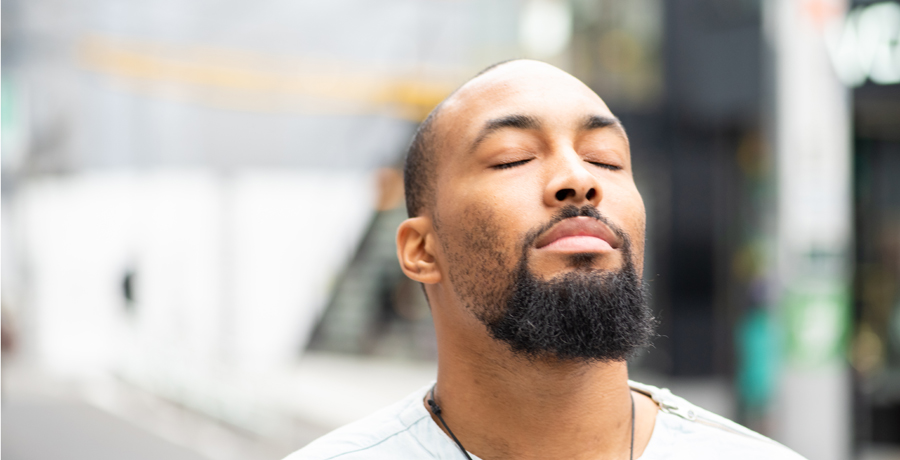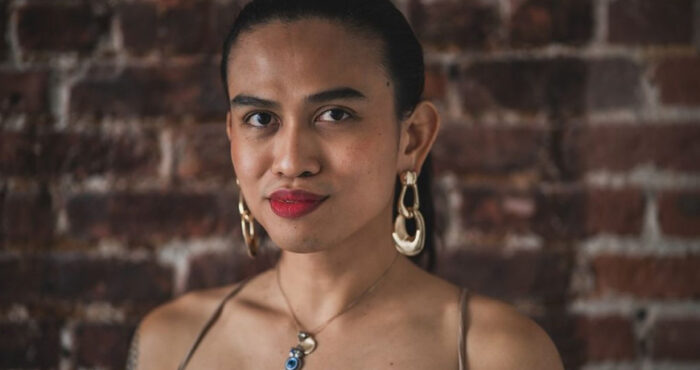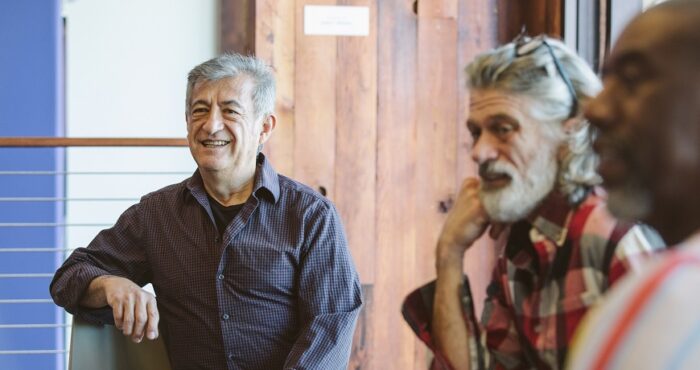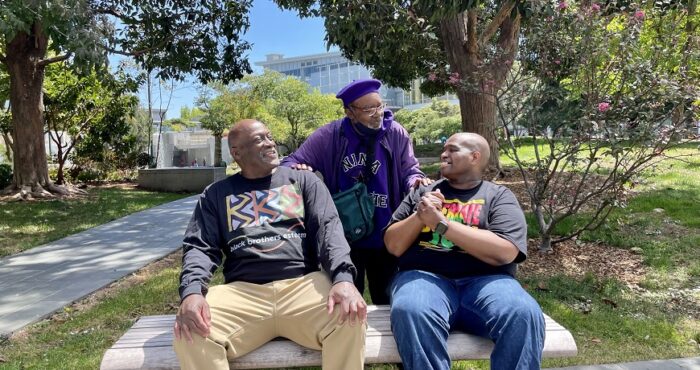Can Meditation Help Heal Queer Communities of Color?

[Leer en español / Read in Spanish]
Many of us have been cut from our usual networks of care, affection, pleasure and exchange during the COVID-19 pandemic. In the context of queer life, this seems especially palpable: So much of how we engage with each other centers around community, contact, and proximity, conditions which now might evoke potential danger and anxiety, risk even. One of the many transformations undergone in the pandemic, then, relates to the amount of time we’ve been forced to spend in isolation, barred from care and kin.
I, like others, found myself yearning anxiously for the outside world. And yet, in those same conditions, I also discovered an opportunity to go inward and cultivate a relationship that often faded into the background of an exciting and rich social life I longed to return to. I discovered a new relationship with mind, and this reinvigorated relationship has extended bountifully towards the shared queer life I practice with others in the world. Here, I seek to make a case for mindfulness as a vital aspect of queer communal care, one that is not separate from the concrete societal equity, justice, and health we so passionately strive towards.
Mindfulness and meditation tend to conjure up a wide variety of images that often distract us from what it actually is and how one could actually integrate such a thing in everyday life. On the one hand, there’s a tendency to associate meditation with a predominantly white and affluent “wellness fanatic” eager to jump on board with the latest form of cultural theft. On the other, there’s a mystified idea of meditation as the solemn activity of monks, a thing utterly incompatible with the busy and dynamic lives we often lead.
To address the first misconception: meditation and mindfulness (terms that serve as umbrellas for a rich and diverse set of culturally-specific practices) should not be considered the sole purview of the rich and trendy. Despite the aggressive forms of marketing and branding that have sought to make meditation yet another signifier of class, this practice does not belong to them. Arguably, it doesn’t belong to anyone at all, even if it is a central aspect of a variety of non-Western spiritual and cultural systems. This urge to brand and create the marketable “identity” of the “meditator” is antithetical to meditation itself.
The second misconception might be harder to overcome at first, given our tendency to relate to things by measuring up our insufficiency, to feel like these things are not for us, that our lives are anything but solemn. But, for all the truly spiritual potential that mindfulness can bring to one’s life, meditation should not become an untouchable, sacred, and pure thing.
Meditation essentially describes our relationship to mind, and our relationship to mind is truly all we have. All we do and say––all the ways in which the world, our environment, and our communities arrive at us and beckon our attention––passes through this elusive thing we call mind.
To be mindful, or to practice mindfulness, is not to sit and become anxious at the failure to block out all thoughts and be completely “blank.” It is, however, to slow down our reactiveness to these thoughts and external stimuli. To allow, to let be. It can involve breathwork or mantra repetition. But it can also look like informally taking the first five minutes of the morning and, instead of sprinting for the phone, to become aware of those first instances of consciousness as we emerge from sleep, before our attention scatters to the many things that are or appear to be urgent. To tend to our minds with the same care we seek for the world.
Perhaps more fundamental than the term “meditation” in a meditation practice is the word “practice” itself. It’s easy to forget that a practice already implies that we will struggle and falter a bit. It means, importantly, that we begin again and that we surrender the usual reflex of harsh judgment. It also implies that meditation is not a thing to be conquered, dominated, and perfected once and for all. To begin again, fresh and new each time, carries with it a very subtle but transformative teaching: mindfulness is a practice of recurring and insistent self-compassion.
The more we are able to allow ourselves––in those five or two or ten minutes of sitting in silence with our mind––to return to the breath even as we inevitably trail away (and we will, many times, even as “advanced meditators”), the more we become aware of how we can practice this compassion and non-judgement in other spheres of our lives, the spheres we inhabit in common with the consciousness of others, in the communities we hope to build and rebuild justly. A softness with self engenders a softness with the world in turn, but it must be practiced gently first within, then without. How could this not be but a building block of more compassionate and present communities, this care turned inward?
This was probably one of the early insights I gained from starting a meditation practice. Being part of that great social world outside my mind also meant being constantly at the mercy of comparison and harsh self-critique regarding the adequacy of my body or my social status. Queer people of color, especially, experience this kind of isolation and self-comparison in disproportionately higher levels given a world predicated on neutral whiteness and upward social mobility, where “queer” has often implicitly meant access to capital and to normative ideas about embodiment and attraction. We pursue these without question and seemingly to no end.
Mindfulness––the initial failure, the distraction and restlessness, their invitations to begin again––interrupted and made me aware of these habitual patterns of violence to the self. It has made all the difference to cultivate and nurture this inner space, a space I then am able to practice in community with others, where I become more present for those with whom I share and practice love queerly, and where I have so much more to offer.
Undoing these silent violences living in our mind is not separate from our communal efforts to eradicate violence in our relationships, encounters, and communities. During the first major lockdown in 2020, I attended a virtual community sliding-scale meditation with Rev. angel Kyodo williams, a Black writer, activist, and ordained Zen priest. This moment also coincided with the powerful wave of anti-racist activism and protest in the wake of the murder of George Floyd. Rev. Williams, predicting our tendency to criticize our attention span and our relationship to meditation, reminded us midway through the session that the undoing of carceral and police logic begins with a commitment to its undoing in ourselves. In meditation, this undoing looks like an ability to begin again, without shame or harsh discipline. I felt, in the BIPOC-centered space that seemed so opposite to social action, the seeds of compassionate and equitable futures to come.
Mindfulness matters to a queer communal future because this future stems precisely from the very now in which we live and breathe, from the very selves that dream up utopian possibility. A gentle and personalized daily practice of meditation is not antithetical to societal change. Rather, it paves the way for a sturdy foundation of compassion with self, one that puts us in a place where we are able to work towards holistic and all-encompassing health. There is no equity in common until we are all afforded space for the mind to relax, for the breath to settle, and for the openness required for empathy––one of the fundamental aspects of health, justice and equality––to thrive.
A note on some resources: here’s the website to sign up for rev. angel’s amazing and financially-accessible sessions, which happen at several moments throughout the year. I would also highly recommend her book Radical Dharma: Talking Race, Love, and Liberation. Meditation apps like Waking Up, for example, will give out renewable free one-year subscriptions on the basis of self-reported need. The meditation app Liberate has a wealth of Black-centered guided meditations.










